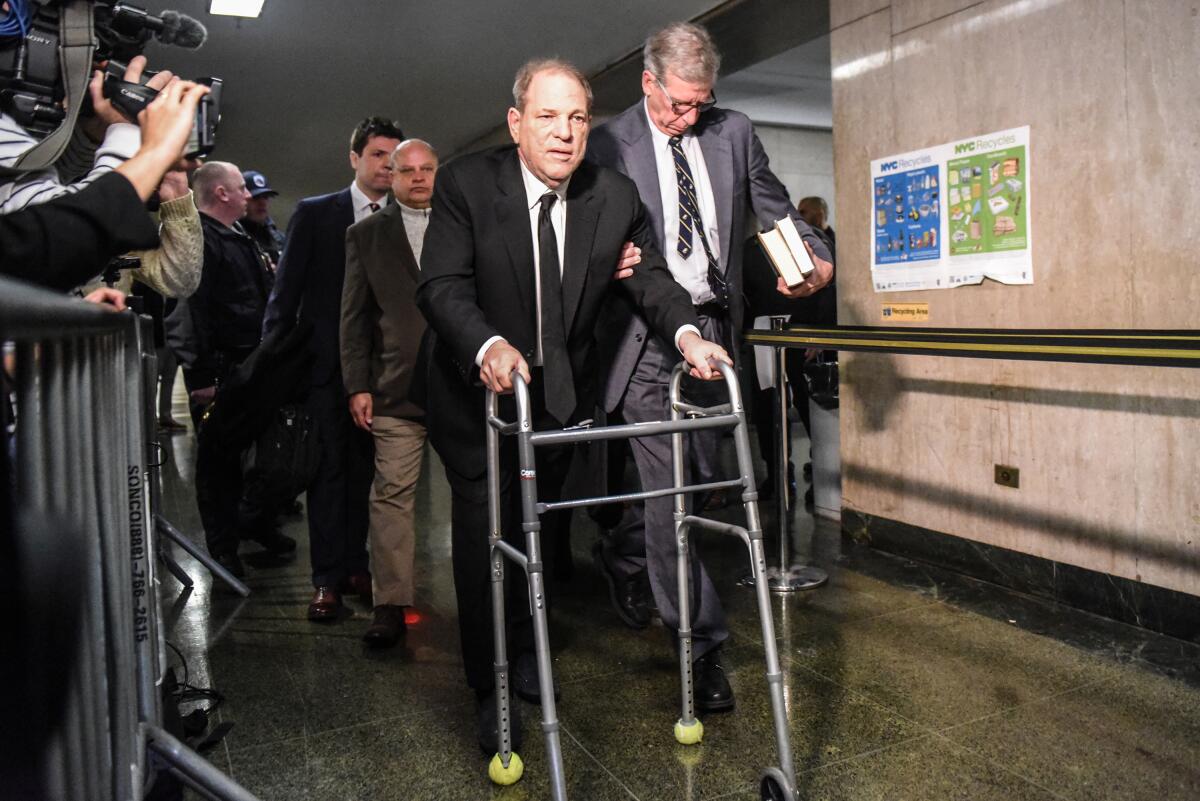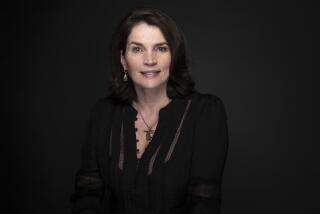Harvey Weinstein is ‘an innocent man,’ defense says at closing argument of New York trial

- Share via
NEW YORK — In a scathing closing argument, Harvey Weinstein’s lead attorney attacked prosecutors and the media Thursday and implored a New York jury to make what she described as an unpopular choice: to acquit the mogul of five counts of sexual assault.
As she stood before the jury of seven men and five women, Donna Rotunno asked them to use “New York City common sense” to guide their decision-making and to focus on the evidence presented at trial rather than the maelstrom of negative press Weinstein received between the start of the #MeToo movement in 2017 and his trial.
“You may have had a gut feeling that Harvey Weinstein was guilty,” she said. “Throw that gut feeling right out the window.”
Rotunno’s remarks came after three weeks of testimony in the Manhattan criminal courthouse. Weinstein, 67, faces five felony charges in New York, including rape, criminal sexual assault and predatory sexual assault. The producer faces a minimum of 25 years in prison and could be locked away for the rest of his life if convicted on the last charge.
The charges stem from accusations by Mimi Haley, a former employee of Weinstein’s production company who alleges Weinstein forcibly performed oral sex on her in 2006, and Jessica Mann, a former aspiring actress who testified that the producer raped her in a New York hotel room in 2013.
To earn a conviction on the predatory sexual assault charge, prosecutors must convince jurors that Weinstein assaulted Haley or Mann, as well as “Sopranos” actress Annabella Sciorra.
Three other women also testified that Weinstein assaulted them, but their crimes were either too old to prosecute or happened outside the jurisdiction of the Manhattan district attorney’s office. One woman’s allegation about an assault in a Los Angeles hotel led prosecutors to file charges against Weinstein in Southern California.
Weinstein has denied any wrongdoing and pleaded not guilty to all charges.
On Thursday, Rotunno repeatedly described the prosecution’s case as an “alternate universe” in which Weinstein “is a monster, he’s unattractive, he’s overweight.”
“In their story, they’ve created a universe that strips adult women of common sense, autonomy and responsibility. It’s offensive, actually,” she said.
She went on: “They’re not responsible for the parties they attend, the men they flirt with, the choices they make to further their own careers ... the jobs they ask for help to obtain.”
The defense has routinely seized upon the fact that Haley and Mann kept in contact with Weinstein, and in some cases engaged in consensual sex with him, after the dates of their alleged assaults.
Rotunno questioned why Haley continued to see Weinstein after the alleged assault in the summer of 2006, and contended that it was because they were in a romantic relationship, not a professional one, as Haley had told the jury.
“Seeing Harvey was something that made her happy,” Rotunno said.
Rotunno and co-counsel Damon Cheronis have painted the women as manipulative liars who controlled their relationships with Weinstein, flipping the narrative of the mogul as a predator on its head.
And the attorneys have emphasized the idea that the lines of the women’s relationships with Weinstein were blurry at best. During Mann’s days-long, emotional testimony, Rotunno confronted the woman with praise-heavy emails and notes she sent the mogul after he allegedly attacked her.
Mann testified that she sought validation from Weinstein and that he was a “pseudo-father” to her.
Rotunno argued Thursday that Mann had become a pawn of the Manhattan district attorney’s office.
“I feel sorry for Jessica Mann. She is a victim of this table,” Rotunno said, pointing to the prosecutors.
The defense spoke little of Weinstein’s character, other than the fact that he was willing to help his accusers when they came to him.
According to trauma experts, there are many reasons why a sexual assault survivor might stay in contact with their abuser. They might be dependent financially or emotionally on the people who assaulted them, they could fear professional or personal retaliation, or they might blame themselves for the assault.
The Weinstein case is seen as a watershed moment for the #MeToo movement, which was triggered by the chorus of women who in 2017 began speaking out about the mogul’s alleged abuses. More than 90 women have publicly accused Weinstein of sexual misconduct.
Weinstein’s fate will soon be in the hands of the jury. Prosecutors are expected to deliver their closing arguments Friday.
Dmitriy Shakhnevich, a criminal defense attorney who now teaches at the John Jay College of Criminal Justice in Manhattan, said the success of Weinstein’s defense will likely rest more on how jurors received Rotunno and Cheronis’ cross-examination of the accusers than anything they presented in their direct case.
There are enough instances of reasonable doubt in this case to sway a jury, Shakhnevich said, including Sciorra’s inability to remember the date of the alleged assault or Haley’s and Mann’s continued contact with the mogul after they say they were raped by him.
“You’re gonna try [this case] on the fact that these women are, for some reason, not telling the truth. Maybe even involuntarily not telling the truth,” he said, referring to the testimony given by psychologist and memory expert Elizabeth Loftus last week.
Rotunno drew on this idea that memory is fallible in her closing arguments. She noted that the case relies mainly on the accounts of the accusers, whose testimonies were sometimes incomplete or contradictory to what they had told investigators in the past. And she asserted that their stories were influenced by media coverage and interviews with investigators.
She also argued that Sciorra might have “changed her memories” of her alleged encounters with Weinstein in the early 1990s in a desperate attempt to gain attention and revive her acting career.
“She’s a star. She has new agents. Now she’s the darling of the movement of the moment,” Rotunno said.
Rotunno told jurors that they were the last line of defense against an “overzealous media, an overzealous prosecutor” that were caught up in the excitement of the burgeoning #MeToo movement.
“As Harvey Weinstein sits here, he sits here an innocent man. He was innocent when the D.A. charged him … he was innocent when each witness took the stand,” she said. “He’s innocent as he sits there right now.”
Newberry reported from New York and Queally from Los Angeles.
More to Read
Sign up for Essential California
The most important California stories and recommendations in your inbox every morning.
You may occasionally receive promotional content from the Los Angeles Times.












